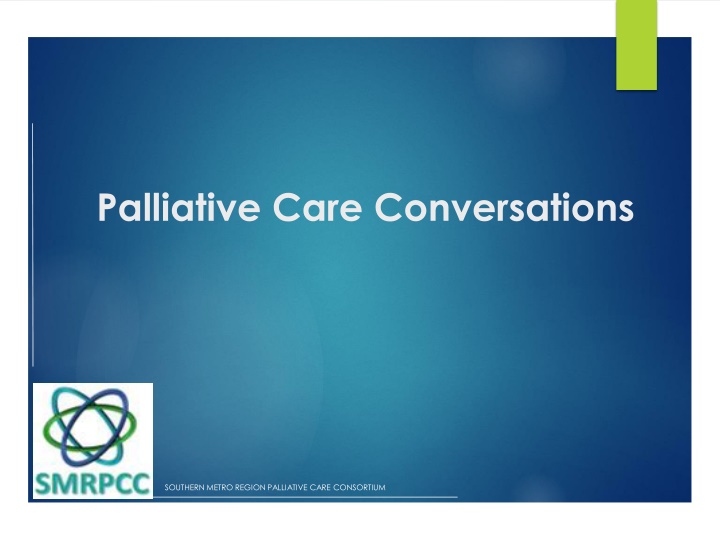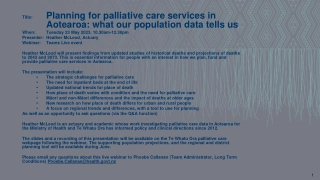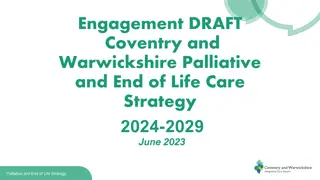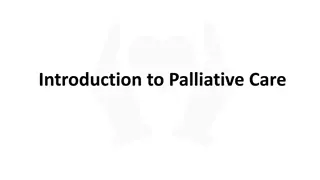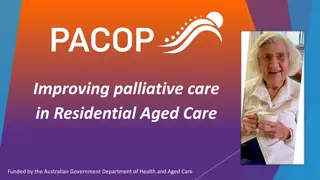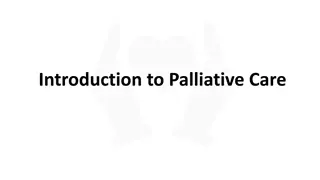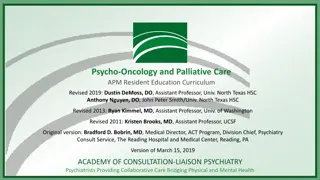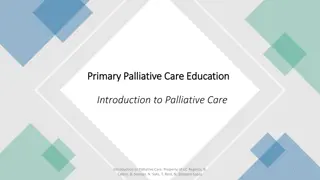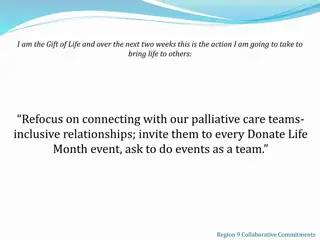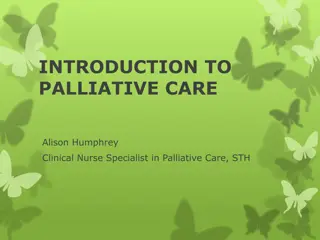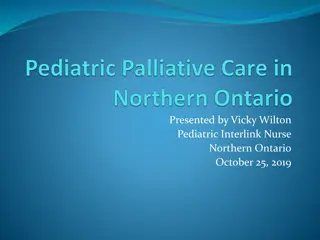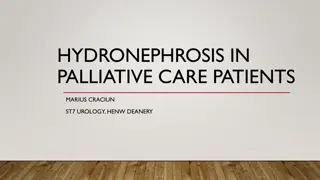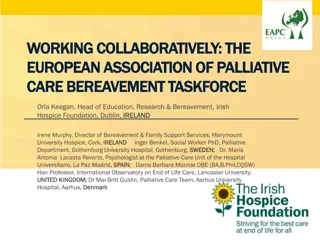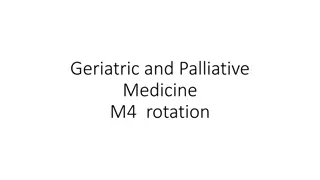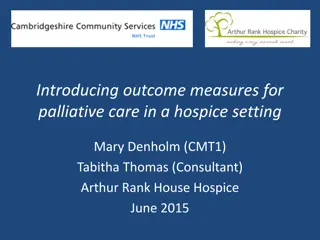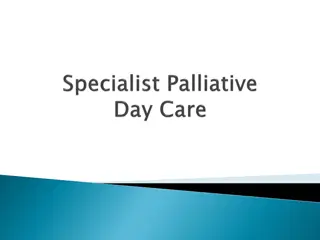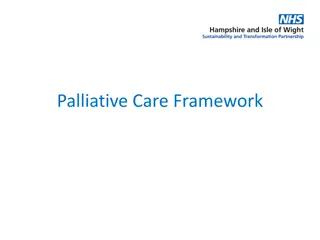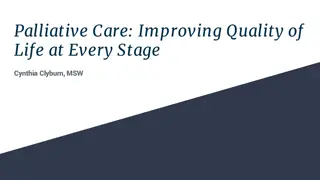Palliative Care Conversations
The critical aspects of palliative care, from diagnosis of life-limiting illnesses to end-of-life care options. Understand the importance of palliative approach and specialist care referrals. Discover how palliative care can alleviate uncertainties, emotional distress, and various symptoms, providing comfort and support to patients and families. Learn about different palliative care settings, including community care, inpatient units, and hospital consultancy. Delve into the roles of community palliative care services in delivering specialized support at home, and the distinctions between short-term symptom control and long-term ongoing care in inpatient palliative settings. Recognize the significance of early referrals to specialist palliative care services for timely intervention and management of complex needs.
Download Presentation

Please find below an Image/Link to download the presentation.
The content on the website is provided AS IS for your information and personal use only. It may not be sold, licensed, or shared on other websites without obtaining consent from the author.If you encounter any issues during the download, it is possible that the publisher has removed the file from their server.
You are allowed to download the files provided on this website for personal or commercial use, subject to the condition that they are used lawfully. All files are the property of their respective owners.
The content on the website is provided AS IS for your information and personal use only. It may not be sold, licensed, or shared on other websites without obtaining consent from the author.
E N D
Presentation Transcript
Palliative Care Conversations SOUTHERN METRO REGION PALLIATIVE CARE CONSORTIUM
Diagnosis of a life limiting illness Difficult conversations The move from curative to palliative Referral to specialist palliative care or palliative approach Options for end of life care- funeral planning, advance care planning, legal issues
relieve without curing The verb to palliate means to ease or comfort to reduce the severity of
What can be palliated? uncertainty the search for knowledge and understanding emotional distress financial uncertainty family function and need for support the desire to understand options spiritual needs symptoms
What is palliative care? Palliative Approach Specialist Palliative Care referralto a specialist palliative care agency care of the dying through generalist services for management of complex needs and symptoms (e.g. aged care facility/GP)
Where is palliative care? Community Palliative Care Palliative Care Inpatient Unit (Hospice) Hospital consultancy
Provides assistance to patients, families and carers in their home What is community palliative care? Different agencies have different service models Staff work in conjunction with local services and the GP Provides access to specialist palliative care and expertise
SHORT TERM symptom control/pain management stabilisation of condition respite-relief for family/carer What is in-patient palliative care? LONG TERM ongoing care till death
Referral referral to specialist PC when there is a specialist need early referral is beneficial and palliative care services will respond according to their resources and the urgency of the referral level of involvement can change as required
Who can make a referral? hospital medical staff self-refer, family/carer GP or specialist doctor, other health professionals ring the local palliative care provider and discuss the situation Ensure patient is in the service s catchment To find the local one, check www.pallcarevic.asn.au/
What is an appropriate referral? Person is diagnosed with a life-limiting illness and is not receiving curative treatment (but may be receiving treatment for symptom management) Person has needs which require the services of a specialist palliative care agency Person/family/carer are aware of the palliative status and the referral Person lives in the catchment area of the agency they wish to be referred to
Information to include relevant contact details of health care providers, referral source, and family/carers prognosis and whether or not the patient and family/carers knows and understands this current medical history, medication list and psycho-social situation reason for the referral to a specialist palliative care agency e.g., Psycho-social support, symptom management detailing symptoms of concern. the urgency of the referral
Barriers to end of life conversations lack of confidence fear of reactions not sure of support from the workplace religious /cultural knowledge ethical /legal boundaries
Recognition and Support palliative care conversations are difficult clinical practice guidelines developed to support communication of prognosis and end-of-life issues health professionals to consider the recommendations conveyed by the acronym PREPARED
PREPARED Prepare for the discussion Relate to the person Elicit patient and caregiver preferences Provide information Acknowledge emotions and concerns (Foster) Realistic hope Encourage questions Document
Before the Conversation
Prepare for the conversation know everything possible about the medical and psychosocial history before the discussion ensure privacy and uninterrupted time negotiate who should be present ensure appropriate environment and timing
What does the patient know? Patient may choose not to know about their prognosis Patient may not accept their potential death Patient may delegate care decisions and discussions to someone else
Engaging with the patient, caregiver and the family
Create rapport make sure you have sufficient skill allow time provide attentive interaction and skilled communication treat people as individuals and be culturally aware
Communicate effectively empathy active listening restatement /reflection revisit conversations document and update information
Elicit patient and caregiver preferences It is critical that preliminary discussion identifies the wishes of the patient Interpreters may be necessary Clarify the patient s or caregiver s understanding of their situation Establish how much detail and what they want to know Ask about cultural and contextual factors influencing information preferences Consider the caregiver s distinct information needs, which may require a separate meeting (provided there is patient consent)
Barriers to effective communication Focus on health provider I had that problem... Request /explanation Why questions Clich s and false reassurance Everything will be ok
Communication barriers to effective communication Advising Devaluing You should . Don t be sad Everyone has times like that Approval/Disapproval You shouldn t have done that Defending Making excuses Changing the subject Is my blood pressure high? What did you have for lunch?
Managing the expectations
Dealing with intense emotion
Dealing with intense emotion Permit the expression of intense emotions without judgement Sit near the person without touching them Do not interrupt or talk Allow them to gather themselves and respond when they indicate they are ready. Ask if there is anyone/anything they need Feelings do not need to be fixed-just expressed Manage your own emotions appropriately
Acknowledge emotions and concerns Explore and acknowledge (patient and/or caregiver) fears, feelings and concerns Respond to distress Be honest without being blunt or giving more detailed than is desired
Manage conversation flow Open questions who, what, when, where opens up dialogue helps to explore issues Closed questions require a yes/no response useful if you are short of time or wish to wind up a conversation
Manage the conversation Manage time allocate sufficient time for each interaction or visit Check their understanding and update continually Ensure sufficient time for them to integrate new information
Ensure understanding Check their understanding and update continually Ask them to repeat the information in their own words so that you know they have understood the content of your conversation Provide written and verbal information if possible and in their language if appropriate
Provideinformation Giving information/normalising experiences in jargon free language about medications resources and services palliative care/welfare/legal medical issues and treatment the dying process-when appropriate advanced care planning grief and loss
Mrs J Has breast cancer with bony metastases Has been aware of this for some time. Has a husband and grown up children. Has had a family meeting to discuss the findings of the latest tests and the prognosis has been given to the family You need to talk to Mrs J. about her options for care in particular a referral to palliative care.
After the conversation
Monitor quality and outcome Monitor the quality and outcome of communications Document and communicate to the team Good outcomes are dependent on a respectful responsive relationship that allows the person to have a partnership with their health professionals
Further skills Identify strengths and challenges and find an appropriate education program Practise, practise, practice experience counts Use supervision and mentoring to enhance knowledge and skill
You now know About palliative care and the settings in which it takes place The process and criteria for palliative care referrals Basic communication skills and techniques for conducting palliative care conversations Where to go for further training and skill development opportunities
Thank You Please complete and return evaluation forms
